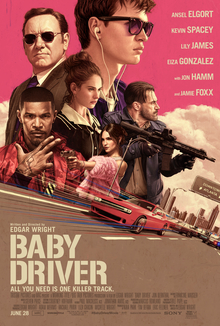There was a time when a car-themed action movie was not an invitation to low expectations. The original Vanishing Point trafficked in a search for meaning and existential themes as much as it did in chase sequences while the original Gone in 60 Seconds, though low-budget and amateurish, showed a remarkable amount of ambition for a small, independent project. Even the first Smokey and the Bandit, cheesy relic that it may be, had plenty of off-kilter charm. These artifacts contrast heavily with today’s self-plagiarizing and self-parodying franchise fare (think Fast and the Furious/Transporter) where cool cars serve as signifiers of anti-heroism and little else.
Fortunately, a pair of 2017 films have made some inroads into reversing this trend. In Edgar Wright’s Baby Driver, the titular protagonist’s prowess behind the wheel is as much a burden as a blessing. The nature of his work also ensures that for every bright red Subaru Impreza he pilots, he also cruises around in far less conspicuous rides. Meanwhile, in Steven Soderbergh’s Logan Lucky, the nominal hero isn’t a hotshot driver. His sister, who operates a borrowed Ford Shelby GT, comes closer to fitting the bill, but her leadfooted proclivities are identified as a potential liability rather than an asset. Both movies work to subvert car flick expectations in interesting ways and are quite entertaining in their own right.
Baby Driver’s Baby (Ansel Elgort) is a young man stricken with tinnitus from the car wreck that killed his parents. He constantly listens to music on his iPod to drown out the ringing in his ears, often while he serves as a getaway driver for heists organized by Doc (Kevin Spacey), to whom he owes a debt. A chance meeting with a waitress, Debora (Lily James), gives Baby a shot at an honest life, but Doc has other ideas.
Aside from his collaborations with Simon Pegg, Wright is perhaps best known for directing Scott Pilgrim vs. The World, and Baby Driver calls that film to mind in its use of music and over-the-top sensibility. Almost all of Baby Driver is synched to Baby’s playlists, and the selection is impressively varied. Everything from Simon & Garfunkel to Queen to Danger Mouse makes an appearance, and the timing is impeccable. The action is well-choreographed albeit often ludicrous, and the same can be said for some of the performances. Jamie Foxx walks a thin line between hilarious and terrifying as the violently unstable robber Bats, and while Spacey might be a despicable human being, he remains a fine actor, adding layers of complexity to the overbearing boss-type that he has played many times before.
That said, James’s role is underwritten and Elgort is all too often overshadowed by the star power that surrounds him. This is also a style-over-substance movie, and while its style is original, fluid, and highly engaging, one wishes there was more than just genre clichés at its heart.
Speaking of familiarity, Logan Lucky can’t help but call to mind Soderbergh’s previous work as it plays like a cross between his Ocean trilogy and Talladega Nights. Newly laid off from his construction job at Charlotte Motor Speedway, Jimmy Logan (Channing Tatum) conspires with his one-handed war veteran brother Clyde (Adam Driver) and sister Mellie (Riley Keough) to rob the Speedway during a big race. To succeed, the siblings will need to break veteran safecracker Joe Bang (Daniel Craig) out of jail, but things become complicated when Bang insists on the participation of his idiot brothers.
Though it lacks Baby Driver’s verve, Logan Lucky is hardly an unstylish film. Soderbergh deploys his usual array of quick cuts, montages, and editing tricks. Both David Holmes’s score and a soundtrack featuring the likes of Loretta Lynn and Patsy Cline fit the film’s setting and on-screen action.
While Logan Lucky’s script (courtesy of the mysterious “Rebecca Blunt,” a possible pseudonym for the director and/or his wife Jules Anser) has its share of funny lines, the movie also derives quite a bit of humor from its casting. From Tatum playing against type as something of a loser to a bleach blond Craig as a redneck savant to Driver (an actual Marine veteran best known for playing the arch nemesis kin to a one-handed warrior) to NASCAR ace Carl Edwards as a state trooper, there are plenty of unexpected, amusing, and inspired choices.
And yet for something that was supposed to momentous – Soderbergh’s return after a well-publicized 2013 retirement – Logan Lucky can’t help but feel like a minor work, an enjoyable movie though not an impactful one. Moreover, the absence may be enough to make the director’s old tricks seem new again, but one hoping for something new may feel a bit let down.
With ninth and tenth installments in the works, we’re in no danger of running out of Fast and Furious films any time soon, and their brand of boisterous brainlessness will continue to cast a large shadow. However, as Wright and Soderbergh have shown us, we needn’t take “car movie” as a synonym for skippable.
Baby Driver: 8/10
Logan Lucky: 7.75/10






















